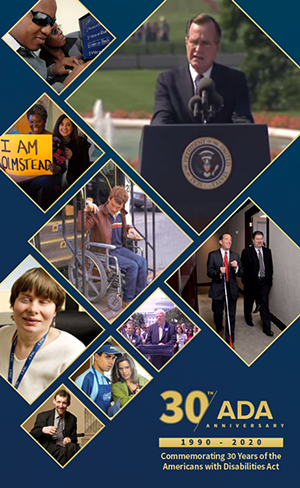The ADA and ODEP
The ADA underpins and inspires all of ODEP's work. Through policy development, outreach and education, and technical assistance, ODEP assists both workers with disabilities and employers in understanding their protections and obligations under the law.
Through its Job Accommodation Network (JAN), ODEP provides extensive technical assistance on the reasonable accommodations provision of the ADA. Covered employers are required to provide "reasonable accommodations" to qualified job applicants and employees with disabilities.  This is defined as any change or adjustment to a job, work environment, or the way things are usually done that would allow an individual with a disability to apply for a job, perform job functions, or enjoy equal access to benefits available to other employees. JAN provides expert guidance, training, and resources to individuals and employers on all aspects of accommodations at no cost. Also available are JAN publications on the ADA and related laws.
This is defined as any change or adjustment to a job, work environment, or the way things are usually done that would allow an individual with a disability to apply for a job, perform job functions, or enjoy equal access to benefits available to other employees. JAN provides expert guidance, training, and resources to individuals and employers on all aspects of accommodations at no cost. Also available are JAN publications on the ADA and related laws.
Note that in the years following the ADA's passage, some courts had narrowed the definition of disability under the ADA. To address this, Congress passed the ADA Amendments Act (ADAAA) in 2008, clarifying various aspects of the law and emphasizing that the definition of disability should be interpreted broadly. Coordinating, monitoring, and enforcing the ADA and ADAAA is the responsibility of a number of federal agencies, including the Department of Justice, the Equal Employment Opportunity Commission, the Department of Education, and the Department of Labor, among others.
Additional Resources on the ADA and ADAAA
- Employers and the ADA: Myths and Facts
- The Employer Assistance and Resource Network on Disability (EARN) is an ODEP technical assistance center that provides resources to help employers recruit, hire, retain and advance individuals with disabilities and comply with their responsibilities under the ADA.
- The U.S. Department of Justice’s "Guide to Disability Rights Laws," is a user-friendly guide to the ADA and related disability rights legislation.
- ADA.gov, the Federal Government’s central source for information about the ADA and ADAAA, has information, resources and technical assistance materials on all aspects of the law, with links to the various agencies that have enforcement responsibilities.
- The Equal Employment Opportunity Commission is the agency responsible for administering the ADA's employment provisions and offers a number of disability-related resources, including regulatory guidance and technical assistance on all aspects of the ADA and employment. Just a few examples include:
- The ADA National Network is a federally funded network of 10 regional centers offering businesses, government agencies and individuals information, guidance and training on the ADA, including its employment provisions.
- "A Primer for State and Local Governments" explains the nondiscrimination requirements of the ADA, in particular as they relate to Title II of the ADA. Title II applies to all State and local governments and all departments, agencies, special purpose districts and other instrumentalities of State or local government ("public entities").
ADA30
 Increasing Access and Opportunity
Increasing Access and Opportunity
Throughout 2020, the U.S. Department of Labor (DOL) celebrated the 30th anniversary of the Americans with Disabilities Act (ADA) – landmark legislation that reaffirms our nation's founding ideal of equality for all by increasing access and opportunity for people with disabilities across all aspects of community life, including employment.
At DOL we are committed to delivering on the promise of the ADA, not only for today's workers with disabilities but for future generations as well.
Learn more about:
